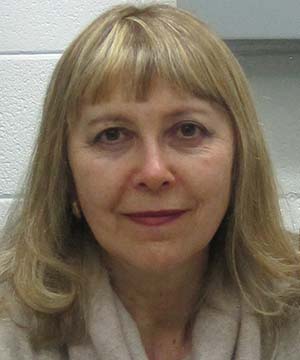
Svetlana G. Lukishova
Professor of Optics
PhD, 1977
- Office Location
- 303 Wilmot Building
- Telephone
- (585) 276-5283
- Fax
- (585) 244-4936
Short Biography
Professor Svetlana G. Lukishova was born in Moscow. She received her BS/MS (with honors) and PhD degrees (1977) from the General and Applied Physics Department of the Moscow Institute of Physics and Technology (FizTech) working at the P.N. Lebedev Physical Institute of the Russian Academy of Sciences (RAS). Her senior project on theoretical astrophysics was made at a Nobel Prize winner V.L. Ginzburg’s theory department. Her PhD thesis was supervised by P.P. Pashinin and Nobel Prize winner A.M. Prokhorov and involved spatial beam-profile and temporal pulse-shape control in laser-fusion systems. After holding research positions at the I.V. Kurchatov Nuclear Power Institute, Troitsk branch TRINITI (Moscow Region), the Institute of Radioengineering and Electronics of the RAS (Moscow), and the Liquid Crystal Institute (Kent, OH), she joined the University of Rochester in 1999. In Russia she was awarded the International Science (G. Soros) Foundation a Long-Term Grant, the Russian Government and the Russian Foundation for Basic Research Grants for her work on nonlinear optics of liquid crystals. In addition to her research, she supervised and taught students at FizTech and served for the Soviet/Russian Committee of the International Scientific Radio Union URSI. She served at the Optica Award committees (C.E.K. Mees Medal and Max Born Award). She also served 6 years as a Topical/Associate editor of Optics Letters on nanophotonics, liquid crystals and nonlinear optics.
After 30-year-experience with high-power laser systems and interaction of laser radiation with matter she moved to quantum nanophotonics, that is currently her main research area in addition to liquid crystals. Awarded four NSF grants and a Wadsworth C. Sykes Faculty Engineering Award she created the Quantum Optics, Quantum Information and Nanooptics Teaching Laboratory facility and developed two undergraduate and one graduate courses on this facility. She also created and directs the University of Rochester undergraduate program on the Certificate in Nanoscience and Nanoengineering. In addition to her research, she is currently teaching three undergraduate and one graduate courses.
Research Overview
Professor Lukishova’s research interests include both optical material and optical radiation properties, in particular, quantum nanophotonics, liquid crystals, and nonlinear optics. She has approximately 250 publications including co-editing and chapters of two Springer books: “Self-focusing: Past and Present. Fundamentals and Prospects” (2009) and “Quantum Photonics: Pioneering Advances and Emerging Applications” (2019).
She is now working on room-temperature sources of indistinguishable single photons for secure quantum communication, that includes single-emitter confocal fluorescent and atomic force microscopies, nanophotonics, nanoplasmonics, and nanofabrication. Her experience with both quantum optics and liquid crystals permitted to create single-photon sources with definite circular and linear polarizations and to measure single photon traversal times along the bandedges of the cholesteric liquid crystal photonic bandgap structures.
Earlier she obtained important results in nonlinear optics of liquid crystals under nanosecond laser irradiation: athermal helical pitch unwinding of the cholesteric mirrors, feedback-free kaleidoscope of hexagons in the beam with dye-doped liquid crystals, and in optical power limiting studies that other researchers overlooked (strong dependence of sign and value of nonlinear refraction on a laser-beam diameter, cumulative effects in nonlinear refraction at low pulse repetition rate (5-10 Hz) and pattern formation in a single beam with nonlinear absorption). She also worked on cholesteric lasers.
In Moscow, Professor Lukishova summarized her experience on high-power laser beam spatial profile formation in her second written Russian dissertation that was recommended to its defense by the Scientific Council of the General Physics Institute of RAS “Coherent Beam Apodization as the Method of Improving High-Power Laser Beam Quality and Divergence” (In addition to a PhD level degree, there is a second academic degree in Russia, the "Doctor of Sciences"). Shortly after the Council, S. Lukishova moved to the USA, but used this experience in her 2009 Springer book.
Professor Lukishova has ten publications on the history of science including a second part of her 2019 Springer book devoted to the history of quantum and nonlinear optics before laser invention.
Research Interests
- Quantum Nanophotonics
- Liquid Crystals
- Nonlinear Optics
- Quantum and Nano-Optics Teaching Experiments
- History of Optics and Photonics
